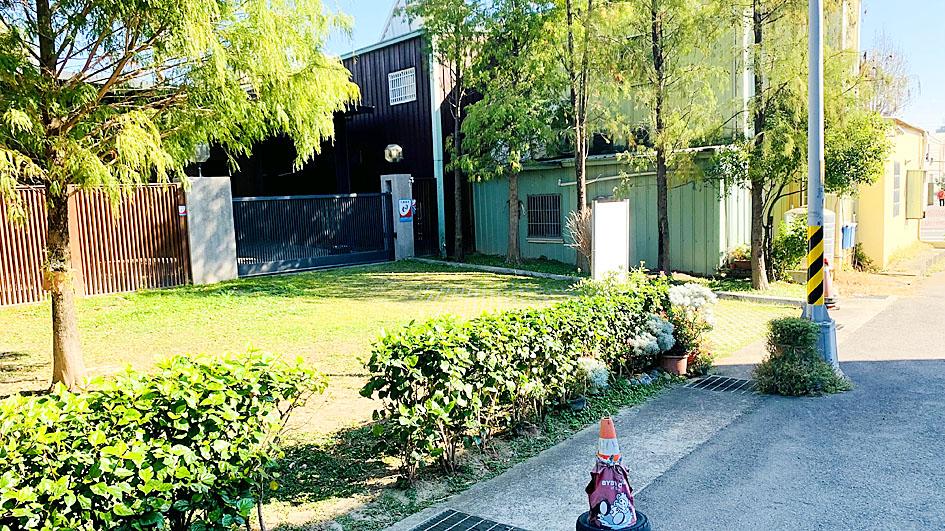The family of Chinese Nationalist Party (KMT) Taichung by-election candidate Yen Kuan-heng (顏寬恒) owns a guest house that was built illegally on national property, National Property Administration Taichung Central District (中區) Division Director Chao Tzu-hsien (趙子賢) said yesterday.
The guest house in Taichung’s Nantun District (南屯) occupies two plots of national land, Chao said, adding that he would commission a lawyer to set up the process of having the building demolished and the land returned to the government, as well as to seek an indictment.
Allegations that the guest house was illegally constructed had prompted calls for an investigation by city officials, so Chao went to survey the property and confirm whether it was illegal.

Photo: Tsai Shu-yuan, Taipei Times
“Looking at aerial photographs we confirmed that the building was constructed in 2004. This use of the land breaches the regulations,” he said. “We will have the property returned and proceed with a legal investigation.”
The building of the guest house might also involve breaches of the Criminal Code, which would be determined by prosecutors via an investigation, he said.
Yen Kuan-heng’s brother, Yen Jen-hsien (顏仁賢), yesterday said that the property would be demolished in two weeks.
Democratic Progressive Party Taichung by-election candidate Lin Ching-yi (林靜儀) yesterday said that public figures should “work for the benefit of the public, not for their own benefit of that of their family.”
Voters would use the news as important information when deciding who to vote for in Sunday’s by-election, she said.
The by-election to fill the seat for Taichung’s second electoral district follows the recall of former legislator Chen Po-wei (陳柏惟) of the Taiwan Statebuilding Party in October.
Additional reporting by Ou Su-mei

AGING: As of last month, people aged 65 or older accounted for 20.06 percent of the total population and the number of couples who got married fell by 18,685 from 2024 Taiwan has surpassed South Korea as the country least willing to have children, with an annual crude birthrate of 4.62 per 1,000 people, Ministry of the Interior data showed yesterday. The nation was previously ranked the second-lowest country in terms of total fertility rate, or the average number of children a woman has in her lifetime. However, South Korea’s fertility rate began to recover from 2023, with total fertility rate rising from 0.72 and estimated to reach 0.82 to 0.85 by last year, and the crude birthrate projected at 6.7 per 1,000 people. Japan’s crude birthrate was projected to fall below six,

US President Donald Trump in an interview with the New York Times published on Thursday said that “it’s up to” Chinese President Xi Jinping (習近平) what China does on Taiwan, but that he would be “very unhappy” with a change in the “status quo.” “He [Xi] considers it to be a part of China, and that’s up to him what he’s going to be doing, but I’ve expressed to him that I would be very unhappy if he did that, and I don’t think he’ll do that. I hope he doesn’t do that,” Trump said. Trump made the comments in the context

SELF-DEFENSE: Tokyo has accelerated its spending goal and its defense minister said the nation needs to discuss whether it should develop nuclear-powered submarines China is ramping up objections to what it sees as Japan’s desire to acquire nuclear weapons, despite Tokyo’s longstanding renunciation of such arms, deepening another fissure in the two neighbors’ increasingly tense ties. In what appears to be a concerted effort, China’s foreign and defense ministries issued statements on Thursday condemning alleged remilitarism efforts by Tokyo. The remarks came as two of the country’s top think tanks jointly issued a 29-page report framing actions by “right-wing forces” in Japan as posing a “serious threat” to world peace. While that report did not define “right-wing forces,” the Chinese Ministry of Foreign Affairs was

PREPAREDNESS: Given the difficulty of importing ammunition during wartime, the Ministry of National Defense said it would prioritize ‘coproduction’ partnerships A newly formed unit of the Marine Corps tasked with land-based security operations has recently replaced its aging, domestically produced rifles with more advanced, US-made M4A1 rifles, a source said yesterday. The unnamed source familiar with the matter said the First Security Battalion of the Marine Corps’ Air Defense and Base Guard Group has replaced its older T65K2 rifles, which have been in service since the late 1980s, with the newly received M4A1s. The source did not say exactly when the upgrade took place or how many M4A1s were issued to the battalion. The confirmation came after Chinese-language media reported